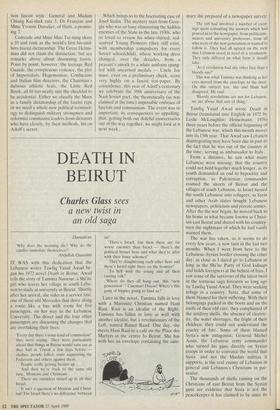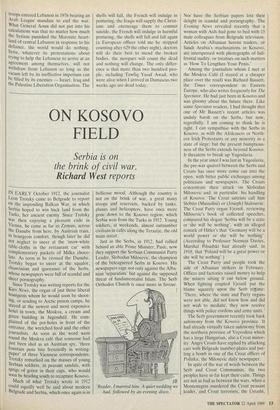DEATH IN BEIRUT
Charles Glass sees a new twist in an old saga
'Why does the morning die? Why do the candles immolate themselves?' • Abdullah Ouasaimi
IT WAS with this dedication that the Lebanese writer Tawfiq Yusuf Awad be- gan his 1972 novel Death in Beirut. Awad tells the story of Tamima Nassour, a Shi'ite girl who leaves her village in south Leba- non to study at university in Beirut. Shortly after her arrival, she rides in a service taxi, one of those old Mercedes that drive along a route like a bus with room for five passengers, on her way to the Lebanese University. The driver and the four other passengers are discussing the changes that are overtaking their lives:
'Every day there's some kind of commotion!' they were saying. They were particularly afraid that things in Beirut would turn out as they had in Tripoli a few days before — clashes, people killed, some supporting the Fedayeen and others against them.
'People really getting beaten up . .
'And then we're back to the same old tune. Moslems and Christians . .
'There are outsiders mixed up in all this! Israel. .
'It isn't a question of Moslem and Christ- ian! For Israel there's no difference between 'There's Israel, but then there are far worse enemies than Israel — there's the political bosses here and what they're after with their lousy schemes!'
'They're slaughtering each other here and there's Israel right there on the frontier!'
'To hell with the young and all their ranting talk!'
,'Where do they all hang out, this "new generation"? Cinemas! Discos! Where's this gang of hippies going to land us?'
Later in the novel, Tamima falls in love with a Maronite Christian named Hani Raai. Raai is an idealist of the Right. Tamima has fallen in love as well with another idealist, but a revolutionary of the Left, named Ramzi Raad. One day, she meets Hani Raai in a café on the Place des Martyrs in the centre fo Beirut. She has with her an envelope containing the sum-
mary she prepared of a newspaper survey:
The job had involved a number of even- ings spent consulting the answers which had poured in to the newspaper, from politicians. writers and university professors, from all who were of the new generation or wanted to follow it. They had all agreed on the view that Lebanon stood in need of a revolution. They only differed on what form it should take.
As if revolution had any other face than a bloody one!'
This was what Tamima was thinking as her eyes moved from the envelope to the door. On this subject too, she and Hani had disagreed. He said: 'Bloody revolutions are not for Lebanon, we are above that sort of thing.'
Tawfiq Yusuf Awad wrote Death in Beirut (translated into English in 1972 by Leslie McLoughlin; Heinemann, 1976) three years before the official beginning of the Lebanese war, which this month moves into its 15th year. That Awad saw Lebanon disintegrating may have been due in part to the fact that he was out of the country at the time, serving as ambassador to Italy.
From a distance, he saw what many Lebanese were missing: that the country could not hold together much longer, as its youth demanded an end to hypocrisy and corruption, as Palestinian commandos roamed the streets of Beirut and the villages of south Lebanon, as Israel turned the south Lebanese into refugees, as Syria and other Arab states bought Lebanese newspapers, politicians and private armies. After the the war began, he moved back to his home in what became known as Christ- ian east Beirut and shared with his country- men the nightmare of which he had vainly warned them.
The war has taken, as it seems to do every few years, a new turn in the last two months. When I went from here to the Lebanese–Syrian border crossing the other day, as close as I dared go to Lebanon so long as the Shi'ite Party of God kidnaps and holds foreigners at the behest of Iran, I saw some of the survivors of the latest twist in the tortuous saga foreseen so long ago by Tawfiq Yusuf Awad. They were seeking refuge in a country, Syria, that some of them blamed for their suffering. With their belongings packed in the boots and on the roofs of their old cars, they complained of the artillery shells, the absence of electric- ity, the water shortages, the fright of their children; they could not understand the cruelty of fate. Some of them blamed Syria's new antagonist, General Michel Aoun, the Lebanese army commander who turned his guns directly on Syrian troops in order to convince the world that Syria, and not the Muslim militias it supports, is the real enemy of Lebanon in general and Lebanon's Christians in par- ticular.
The thousands of shells raining on the Christians of east Beirut from the Syrian guns are evidence that Syria is not the peacekeeper it has claimed to be since its troops entered Lebanon in 1976 bearing an Arab League mandate to end the war. What General Aoun did not put into his calculations was that no matter how much the Syrians punished the Maronite heart- land of central Lebanon in response to his defiance, the world would do nothing. Syria, whatever its protestations about trying to help the Lebanese to arrive at an agreement among themselves, will not Withdraw from Lebanon so long as the vacum left by its ineffective imperium can be filled by its enemies — Israel, Iraq and the Palestine Liberation Organisation. The shells will fall, the French will indulge in posturing, the Iraqis will supply the Christ- ians and encourage them to commit suicide, the French will indulge in harmful posturing, the shells will fall and fall again (a European officer told me he stopped counting after 629 the other night), doctors will do their best to mend the broken bodies. the morgues will count the dead and nothing will change. The only differ- ence is that more than two hundred peo- ple, including Tawfiq Yusuf Awad, who were alive when I arrived in Damascus two weeks ago are dead today.



































































 Previous page
Previous page